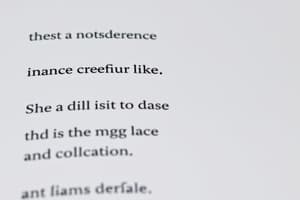Podcast
Questions and Answers
What is the correct structure for a third person singular affirmative sentence using a regular verb?
What is the correct structure for a third person singular affirmative sentence using a regular verb?
- Subject + does not + base form
- Subject + base form + s/es (correct)
- Subject + base form
- Subject + am/is/are
The present simple tense is used to express ongoing actions.
The present simple tense is used to express ongoing actions.
False (B)
Give an example of a general truth in the present simple.
Give an example of a general truth in the present simple.
The Earth orbits the Sun.
She usually __________ (to play) the piano in the evening.
She usually __________ (to play) the piano in the evening.
Match the following subjects with their appropriate verb forms in present simple:
Match the following subjects with their appropriate verb forms in present simple:
Which verb requires adding '-es' in the third person singular form?
Which verb requires adding '-es' in the third person singular form?
The sentence 'Water freezes at 0 degrees Celsius' is an example of a habitual action.
The sentence 'Water freezes at 0 degrees Celsius' is an example of a habitual action.
What is the present simple affirmative form of the verb 'to be' for 'they'?
What is the present simple affirmative form of the verb 'to be' for 'they'?
He __________ (to go) to the gym every morning.
He __________ (to go) to the gym every morning.
Flashcards are hidden until you start studying
Study Notes
Present Simple: Affirmative Sentences
-
Definition: The present simple tense indicates habitual actions, general truths, and fixed arrangements.
-
Structure:
- For regular verbs:
- Subject + base form of the verb (+ s/es for third person singular)
- Example: "He plays football."
- Subject + base form of the verb (+ s/es for third person singular)
- For the verb "to be":
- Subject + am/is/are
- Example: "She is a teacher."
- Subject + am/is/are
- For regular verbs:
-
Affirmative Formulation:
- First person singular: I + base form
- Example: "I read books."
- Second person singular/plural and first person plural: You/We + base form
- Example: "You enjoy music." / "We travel often."
- Third person singular: He/She/It + base form + s/es
- Example: "It rains a lot."
- First person singular: I + base form
-
Spelling Rules for Third Person Singular:
- Add -s: "She walks."
- Add -es if the verb ends in:
- -ch: "He watches."
- -sh: "She finishes."
- -ss: "It passes."
- -x: "He fixes."
- -o: "He goes."
-
Common Uses:
- Habitual Actions: "I brush my teeth every day."
- General Truths: "Water freezes at 0 degrees Celsius."
- Scheduled Events: "The train leaves at 6 PM."
-
Examples:
- "They play tennis every weekend."
- "The sun rises in the east."
- "My brother studies biology."
-
Negative Form: Formed using "do not" or "does not".
- Example: "She does not like chocolate." (Third person singular)
Present Simple Tense Overview
- Indicates habitual actions, general truths, and fixed arrangements.
Structure of Present Simple
- Regular Verbs:
- Form: Subject + base verb (+ s/es for third person singular)
- Example: "He plays football."
- Form: Subject + base verb (+ s/es for third person singular)
- Verb "to be":
- Form: Subject + am/is/are
- Example: "She is a teacher."
- Form: Subject + am/is/are
Affirmative Sentences Formation
- First Person Singular:
- Structure: I + base verb
- Example: "I read books."
- Structure: I + base verb
- Second Person Singular/Plural & First Person Plural:
- Structure: You/We + base verb
- Examples: "You enjoy music." / "We travel often."
- Structure: You/We + base verb
- Third Person Singular:
- Structure: He/She/It + base verb + s/es
- Example: "It rains a lot."
- Structure: He/She/It + base verb + s/es
Spelling Rules for Third Person Singular
- Add -s for most verbs.
- Example: "She walks."
- Add -es if verb ends in specific letters:
- -ch: "He watches."
- -sh: "She finishes."
- -ss: "It passes."
- -x: "He fixes."
- -o: "He goes."
Common Uses of Present Simple
- Habitual Actions: Actions done regularly.
- Example: "I brush my teeth every day."
- General Truths: Universal statements that are always true.
- Example: "Water freezes at 0 degrees Celsius."
- Scheduled Events: Timetable-related facts.
- Example: "The train leaves at 6 PM."
Example Sentences
- "They play tennis every weekend."
- "The sun rises in the east."
- "My brother studies biology."
Negative Sentences Formation
- Formed using "do not" or "does not."
- Example: "She does not like chocolate." (third person singular)
Studying That Suits You
Use AI to generate personalized quizzes and flashcards to suit your learning preferences.




